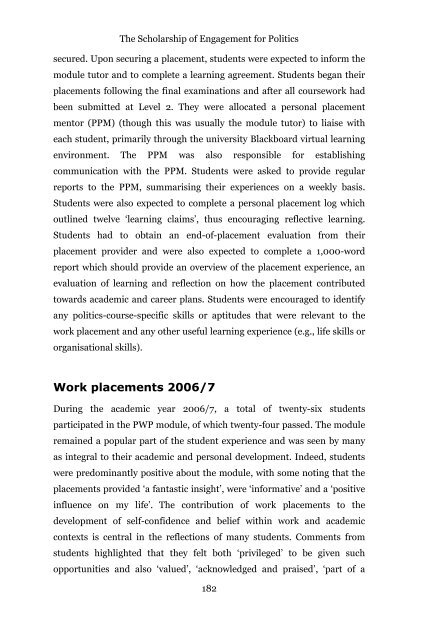The Scholarship of Engagement for Politics: - Higher Education ...
The Scholarship of Engagement for Politics: - Higher Education ...
The Scholarship of Engagement for Politics: - Higher Education ...
Create successful ePaper yourself
Turn your PDF publications into a flip-book with our unique Google optimized e-Paper software.
<strong>The</strong> <strong>Scholarship</strong> <strong>of</strong> <strong>Engagement</strong> <strong>for</strong> <strong>Politics</strong><br />
secured. Upon securing a placement, students were expected to in<strong>for</strong>m the<br />
module tutor and to complete a learning agreement. Students began their<br />
placements following the final examinations and after all coursework had<br />
been submitted at Level 2. <strong>The</strong>y were allocated a personal placement<br />
mentor (PPM) (though this was usually the module tutor) to liaise with<br />
each student, primarily through the university Blackboard virtual learning<br />
environment. <strong>The</strong> PPM was also responsible <strong>for</strong> establishing<br />
communication with the PPM. Students were asked to provide regular<br />
reports to the PPM, summarising their experiences on a weekly basis.<br />
Students were also expected to complete a personal placement log which<br />
outlined twelve ‘learning claims’, thus encouraging reflective learning.<br />
Students had to obtain an end-<strong>of</strong>-placement evaluation from their<br />
placement provider and were also expected to complete a 1,000-word<br />
report which should provide an overview <strong>of</strong> the placement experience, an<br />
evaluation <strong>of</strong> learning and reflection on how the placement contributed<br />
towards academic and career plans. Students were encouraged to identify<br />
any politics-course-specific skills or aptitudes that were relevant to the<br />
work placement and any other useful learning experience (e.g., life skills or<br />
organisational skills).<br />
Work placements 2006/7<br />
During the academic year 2006/7, a total <strong>of</strong> twenty-six students<br />
participated in the PWP module, <strong>of</strong> which twenty-four passed. <strong>The</strong> module<br />
remained a popular part <strong>of</strong> the student experience and was seen by many<br />
as integral to their academic and personal development. Indeed, students<br />
were predominantly positive about the module, with some noting that the<br />
placements provided ‘a fantastic insight’, were ‘in<strong>for</strong>mative’ and a ‘positive<br />
influence on my life’. <strong>The</strong> contribution <strong>of</strong> work placements to the<br />
development <strong>of</strong> self-confidence and belief within work and academic<br />
contexts is central in the reflections <strong>of</strong> many students. Comments from<br />
students highlighted that they felt both ‘privileged’ to be given such<br />
opportunities and also ‘valued’, ‘acknowledged and praised’, ‘part <strong>of</strong> a<br />
182
















